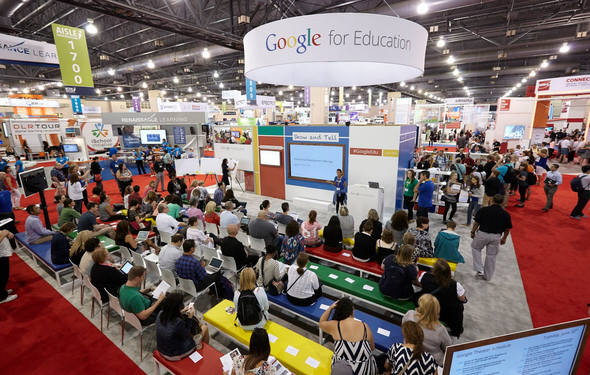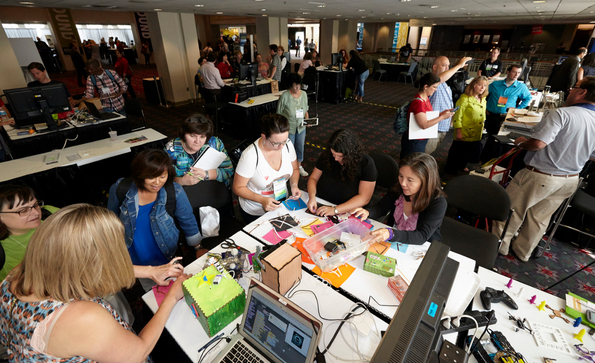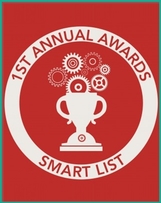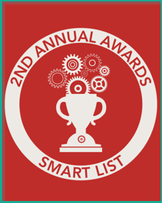
Despite being in the EdTech field for a while now, this was my first chance to attend the conference, and I’m glad I was able to. Any EdTech topic you can imagine is covered ad naseum, so whether you’re looking for ideas on gamification, coding, learning management systems, assessment, classroom management, or literally ANYTHING else, you’re covered.
The positive side to that, is that educators from around the world have a chance to come together, converse, and share in their passion for an enormous variety of topics. The negative side is that, it’s a bit of an EdTech overload. With so many people, apps, companies, sessions, and ideas, it’s easy to get lost in a sea of buzzwords and pretty (though educationally meaningless) tech.
I think that last point is one of major issues that the field of education technology currently faces (and has for some time). I also think this issue is perhaps most clearly seen in places like ISTE, where you have a hyper-concentrated microcosm of the field as a whole.
One of my strongest memories from my first year of teaching was the welcome back PD session for all the teachers. We were rolling out some new literacy initiative, and the district had hired a flashy motivational speaker to come pump us all up and get everyone excited and onboard for this initiative.
After the session, I remember a lot of the newer teachers seeming pretty jazzed and a lot of the more experienced teachers seeming pretty cynical. The root of this cynacism stemmed from a place that we see far too often, and that is the idea that education, as a field, has a very short memory.
Turns out the initiative we were rolling out was nothing new, and had been tried in one form or another many times over the years. Those experienced educators knew that this initiative had not only been done before, but that it would most likely come and go, just like those before.
Now, I realize this line of thinking might also be a bit cynical, and that there are obviously excellent programs and initiatives that are supported, have teacher buy-in, and lead to better learning environments and increased student engagement. But, by and large, it seems like as a whole, we far too often jump onto the next big thing without realizing it’s a road we’ve walked down many times before.
And I think this is even more the case in education technology, where each new device or app or operating system triggers our collective amnesia, and we’re taken in by what’s new while forgetting that these technologies, when not backed by solid pedagogical strategies and PD, are nothing but line items on a purchase order.
Thankfully, I think we’re also starting to see a shift away from this mentality, and for me, that was one of the most beneficial realizations I came away with from ISTE.
Yes, there are still far too many companies that are clearly only in EdTech for the profit, and have absolutely no concern if their products are educationally beneficial or not. Every week I turn down review requests from companies like this who claim they are disrupting education with breakthrough products that will revolutionize education forever. They claim they are standards-aligned, just because they’ve stuck a graphic on their product that says they are. They claim they use research-based methods, with proven results, when in reality they wrote a self-authored case study about a single classroom that they paid to try out their app.
I think this is even more the case in education technology,
where each new device or app or operating system triggers
our collective amnesia, and we’re taken in by what’s new
while forgetting that these technologies, when not backed
by solid pedagogical strategies and PD, are nothing but
line items on a purchase order.
HOWEVER, there are also more and more companies that are understanding that it’s not about the tool, or how cool their app looks, it’s about supporting teachers, supporting students, and supporting learning. Companies that understand that behind every technology tool is a human being, with needs and emotions and hopes, not a market demographic that is to be targeted, but a teacher or student who believes this tool might just help with teaching and learning.
At the end of the day, I strongly believe that technology in the classroom has the power to live up to all of our overused buzzwords. I think it can revolutionize, democrotize, and improve teaching and learning across an enormous variety of contexts, and I have seen examples of this many times throughout my own teaching and experience.
But, we have to get past the point where every time something new comes out we oooh and aaah and forget the fact that we’re here to educate and not to entertain (or to be entertained). Not that entertainment can’t be a part of the modern classroom (I know many who argue it should be), but it shouldn’t be our driving principle, and we shouldn’t continuosuly rely on new technology to re-capture student attention and engagement.
There are also more and more companies that are
understanding that it’s not about the tool, or how cool
their app looks, it’s about supporting teachers, supporting students, and supporting learning. Companies that
understand that behind every technology tool is a
human being, with needs and emotions and hopes,
not a market demographic that is to be targeted, but a
teacher or student who believes this tool might just
help with teaching and learning.
If anything, ISTE showed me that we are getting there. One teacher, one student, one classroom, and one district at a time. Through many failures and false-starts, we’re starting to learn from our past mistakes, and we're starting to remember that technology is not a silver bullet for every educational problem, but rather, it is just another tool in our toolbox.
Please feel free to share your own thoughts on these ideas in the comments!
I'd love to hear from you, and I hope everyone has a great 4th of July weekend!

















 RSS Feed
RSS Feed
